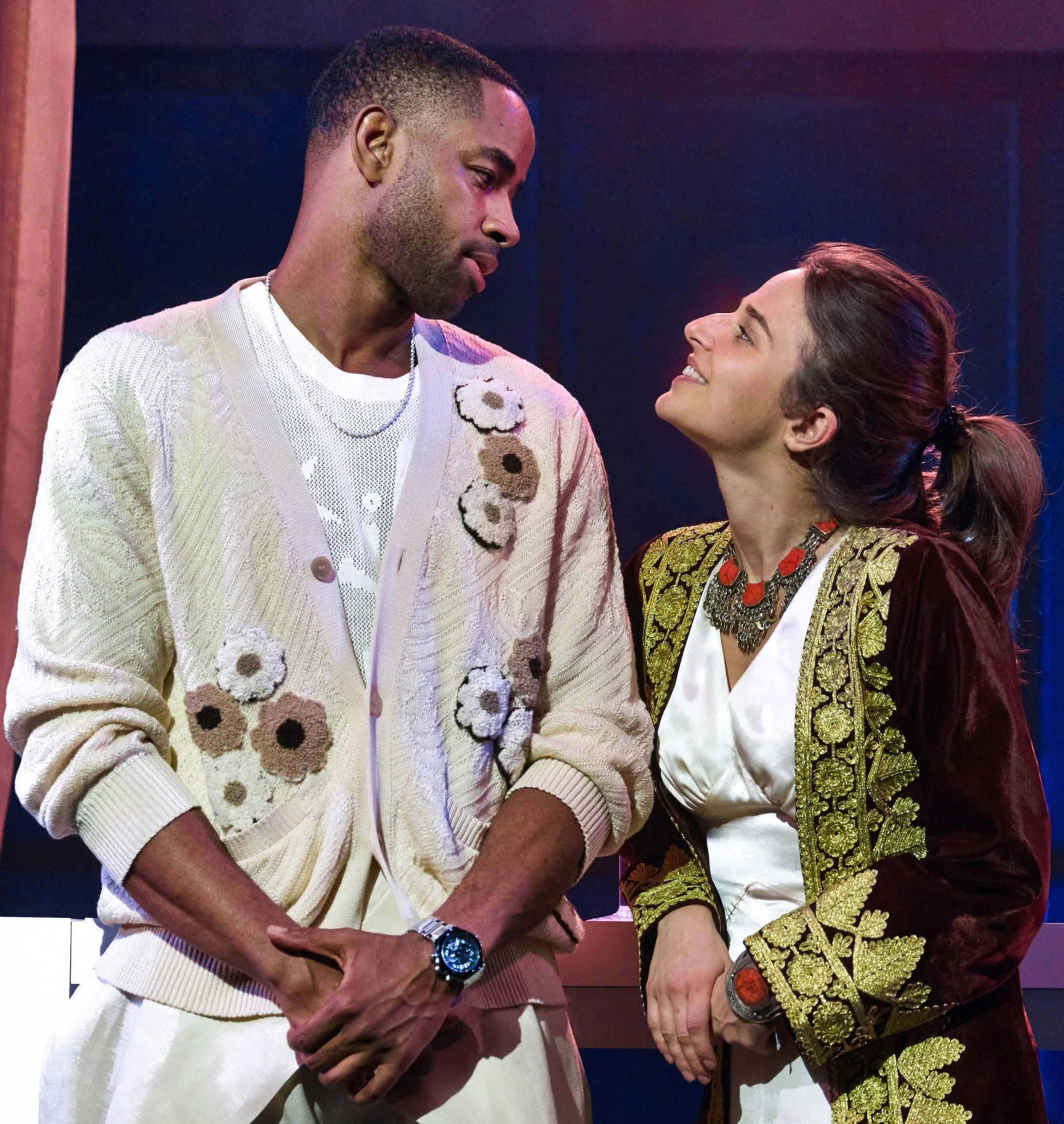Dariush Kashani (left) as Sayeed, an Afghan interpreter, and Stephanie Nur (center) as his daughter Roya welcome Jay Ellis as hip-hop star Duke to Bagram Air Force Base in Afghanistan.
It’s impossible to ignore chemistry, whether it’s as basic and essential as two molecules of hydrogen and one of oxygen, or as toxic and unwelcome as a string of PFAs. In Charles Randolph-Wright’s Duke & Roya, the chemistry goes beyond the molecular level, as Jay Ellis and Stephanie Nur demonstrate in the title roles. It’s a powerful component for this play, which by turns is romantic and political and covers a lot of ground without quite bursting at the seams.
The play opens as Duke (Jay Ellis), a tall, lanky hip-hop artist is being interviewed in the present, and one learns that the interlocutor wants to talk about Afghanistan, where Duke had previously toured (presumably with the USO). “Afghanistan,” replies Duke. “Oh, of course. Everybody still wants to talk about Kabul. That seems so long ago now.” Reluctantly, he lets his memory take over.
Duke is berated by his mother, Desiree (Noma Dumezweni), for his reckless behavior at the base.
The flashback begins in 2016 at Bagram Air Force Base. A younger Duke is a bit full of himself, exuberant and confident and flirtatious. He is known for his sexual conquests, as pop music performers often are, and for his gig at Bagram he has been assigned a female interpreter, Roya, whose proud and liberal father, Sayeed (Dariush Kashani), has worked for the American forces for 14 years. Duke suddenly finds himself more interested in the reticent Roya than in other women he has met, and the resulting culture clash calls to mind John Patrick’s The Teahouse of the August Moon (1953), though the surroundings are more dangerous.
Duke insists on seeing the real Afghanistan and wheedles Roya to secretly arrange it:
Roya: The problem is getting off base. And if we did leave, it is unsafe. Even the American University was bombed. If something happened to you, it would destroy relations.
Duke: They aren’t good anyway, right? We’ve been leaving for years, but yet we’re still here.
Roya: Because we are always at war.
Duke: So are we, it seems.
Roya: Yes, but you go to war. War comes to us.
Sayeed encourages his daughter Roya to look after the visiting Duke.
That the political commentary is oblique is one of Randolph-Wright’s virtues, and director Warren Adams never pushes such moments too hard either:
Roya: I have so many questions about your election. You live in the greatest country in the world. Why are women in power hated so much?
Duke: I have no answers for that. I make rhymes.
Roya does arrange for Duke to leave the base in secret. Though it seems improbable at first, there’s a cultural explanation woven into the plot: an Afghan family with only daughters typically chooses one of them to disguise herself as a man and accompany the women in the family for necessary shopping or doctor’s appointments. Roya arranges for Duke to meet “Aref,” a male friend who will guide him outside the gates, and Duke seeks romantic advice from his new “bro.”
Duke: So dawg, what should I do? Do I make a move, what? I’m not used to asking for it, you know what I mean? Women throw it at me right and left. They can’t help themselves.
Not only is Duke caught out—Aref is, of course, Roya in disguise—but the excursion doesn’t go well. Duke is injured, and while he is in the hospital, his mother, Desiree (an electric Noma Dumezweni), arrives, frantic but clear-eyed: “I am proud of my son’s success,” she tells Sayeed, “but it leads to certain kinds of entitlement that shield or blind you from the real world.”
Duke and Roya share a quiet moment in Dubai. Photographs by Jeremy Daniel.
Although Roya’s participation in helping Duke leave the base stays hidden, complications ensue. During his rehabilitation they grow closer. Desiree, a World Bank official with political strings to pull, arranges a week in Dubai for Sayeed and Roya. And there the play adds a comic twist similar to one in Barefoot in the Park—with a heap of sexual updating.
There are occasional missteps. When Duke quotes the Afghan poet Rumi, he says he learned about his work from “English lit”—a course for which a writer in translation would never be on the syllabus. It also leads to a bit of humanistic force-feeding: “Everybody claims Rumi,” says Roya, “but he was born in Afghanistan. Poetry lives in the people here.”
And, although Duke’s desire to make his own kind of music and escape being pigeonholed by record producers is well-trodden showbiz territory, the instances of familiarity and didacticism—which include the shameful betrayal of Afghan translators by the American government, leaving them stranded without visas to escape—never overwhelm the pleasures of this bittersweet comedy.
Charles Randolph-Wright’s Duke & Roya plays through Aug. 23 at the Lucille Lortel Theatre (121 Christopher St.). Evening performances are at 7 p.m. Monday through Saturday; matinees are at 2 p.m. Thursday and Saturday. For tickets and more information, visit dukeandroya.com or lortel.org.
Playwright: Charles Randolph-Wright
Direction: Warren Adams
Music: Ronvé O’Daniel
Scenic Design: Wilson Chin
Costume Design: Snowber Sabrina Spanta
Lighting Design: Amina Alexander
Projections Design: Caite Hevner
Sound Design: Taylor J. Williams






